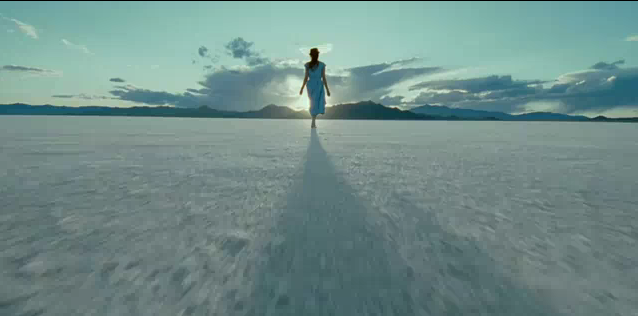Speculation and rumour were impossible to ignore, as always, with Terrence Malick’s fifth feature in a forty-year career,The Tree of Life. And despite receiving boos on premiere day the cheers prevailed as the Cannes jury saw fit to reward The Tree of Life with the Palme d’Or, rightfully so, as for better or worse it was very much the film that dominated the discourse and fervour of the festival whole. But something more than this made it worthy of the top prize. It is daring, powerful movie making of the highest calibre. Enthralling, mesmerising, sublimely arthouse but with lucid purpose, The Tree of Lifeis Malick’s masterpiece – perhaps cinema’s greatest masterpiece – transcending categorization to become a triumphant paean to life, love and everything in between. It in effect makes every other piece of cinema feel, at least while you’re watching, utterly, and completely irrelevant.
Opening with an ethereal narration from beatific mother figure Jessica Chastain which demarcates between selfless grace and commanding nature there is a sense of duality that pervades the rest of the feature. This thematic antagonism is illustrated most overtly between the paternal couple – Mrs. O’Brien (Chastain) encapsulating grace and Mr. O’Brien (Brad Pitt) symbolising nature – and how their competing and, often conflicting, drives galvanise twin feelings within their sons. In this way, love and admiration, hate and fear become synonymous as the oldest of the three, Jack (Hunter McCracken), channels all at once these emotions towards the overbearing ball of simmering frustration that is his father. It’s a wholly believable and emotionally engaging depiction of a family at odds with itself, but struggling to reconcile its place in the world for good or evil.
Indeed both good and evil are witnessed through the eyes of elder son Jack and thus so too is existence. Much like in Days of Heaven flashpoints and poignant memories are touched upon as an older Jack (Sean Penn) reminisces profoundly on his younger years and his loss of innocence on the anniversary of his younger brother’s teenage death. Penn, appearing only fleetingly, embodies with conviction the nauseatingly nostalgic older Jack who paradoxically longs for and fears the tempestuous journey that embodied his youth. But it is the barely contained love-hate chemistry between McCracken and Pitt that drives this feature to excel. Without their relationship as vehicle to illustrate the closeness of possibilities, how love and hate can be so close and so far, the rest of Malick’s creation would fall flat. McCracken always tense around his father and Pitt likewise around his son, the two dance around each other shadowboxing for a title that doesn’t exist. The drama of their relationship is the emotional centrepiece and one of the great cinematic truisms of familial life.
Courageously Malick does not shy away from an understanding or depiction of the world around, portraying the minute local of the O’Brien’s family drama on a universal, global backdrop. After meeting the family in question Malick’s lens pulls back to survey creation itself – a staggering and breathtaking achievement – that combines religiously symphonic movements with mind-bending hypnotic feats of otherworldly effects concocted to echo both the alienation and familiarity we can feel with this beginning of time. Most notably in a scene in which a predatory dinosaur shows compassion, allowing a natural death to its natural prey. It’s a scene that in another’s hands may have felt contrived, and malapropos but here it serves majestically in detailing how those overriding motivations have stretched across time like emotional sinews connecting our present with our beginning.
If this feels intense it’s because it most certainly is. The Tree of Life is superior and extremely demanding filmmaking. Much like Inception it necessitates an acute mind but layers over an even more explosive component, spirituality and religion, and their blatant effect on the family. It can be off putting but with some acceptance it is wholly rewarding and to this effect an incredibly interactive experience. Undoubtedly the closest thing to a ‘religious experience’ that most non-believers will ever undergo it could very much be accused of being openly and offensively spiritually grounded but this misses the point somewhat. No where is God’s hand at work in the early nebulous hymn to creation and only at the bitter end do we see the final reconciliation of an ever strained, but ever loving family dynamic. Rather than exuding religiosity the finale more so metaphorically shows the imperative the movie most attempts to convey; that unless you love your life will pass by. And indeed the O’Brien’s love for each other is as eternal as the portrayed creation, and it is this rather than some divine force which brings them finally together. This evident emotionally engaging family dynamic – rather than the spiritual or creationist overtones – is what makes the movie linger long in the mind after the bright lights have come, or in this case, gone.
The Tree of Life will extend cinematic coils to the most apathetic recesses of your body, mind and soul. It’s engaging, interactive filmmaking of the highest order and a profound assault on the senses that will chip away moment by moment at the insensitivity and conceit we have in our own existence, and what it truly means to be alive and living.







